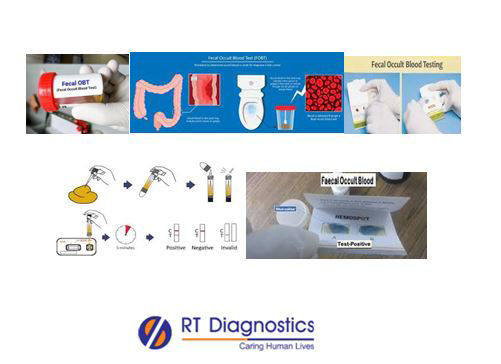Occult - Blood:
Why Occult - Blood Test?
CLINICAL INFORMATION
A stool or feces examination is also known as an enteric sample specimen analysis. It comprises a series of tests. A routine stool test is performed to examine for hidden occult blood, fat meat fibres, bile, WBCs, sugars (fecal sample as a tool of evidence of a medical condition) etc. This test result helps in diagnosing medical conditions including inflammatory bowel disease, gastric or colon cancer etc. This test may be ordered over a period of time if the infection gets worse. Complications due to untreated chronic enteric pathologies can lead to the severe symptom of dehydration, electrolyte imbalance etc.
These tests when performed helps to diagnose certain conditions affecting the GIT (mainly the lower GI abnormalities) – such as Infection and/or parasitic infestations (parasites like protozoan – trophozoites and cysts, viruses, bacteria like C. difficile, Campylobacter, E.coli, Salmonella, Shigella, Plesiomonas, vibrio etc), Mal-absorption eg Celiac disease, IBD like Ulcerative colitis, Hemorrhoids, Polyps, Cancer, Pancreatitis (fatty stools - Steatorrhea) etc. A feces or a stool test is ordered by a physician in case of certain indications with signs and symptoms (clinical manifestations) including diarrhoea, stool with mucus or blood, stomach cramping, nausea, vomiting fever etc. Stool culture and sensitivity test is also performed to detect the presence of disease-causing harmful microbes in sample specimen of suspected patients. Moreover, stool may be tested for the presence of parasites, spores, ova (egg of the parasite) and also roundworm, flatworm, hookworm, tapeworm etc, under the microscope – by a routine microscopic study. A normal routine stool test is also performed to examine for occult blood loss in feces, bile water stools, WBCs in infections (in colon or rectum), sugars etc (these fecal sample specimens are used as a tool of evidence for certain abnormal (medical) conditions, for example - in systemic manifestations like sepsis; but particularly when it is mediated with the GIT diseases/disorders etc). Additional tests include isolation in cell culture, WBCs – Differential count, Calprotectin test, fecal immunochemical tests / Antigen tests eg. Yersinia test, Giardia test, Salmonella culture test, Cryptosporidium test, Test for Entamoeba histolytic, Test for the presence of taeniasis etc. Other tests include CBC, CRP and ESR (inflammation), widal test, microscopic examination for gram stain, other stool tests to examine egg, cyst, ova, spores, parasites test for bacterial toxins, viral antigen stool test, Clostridium difficile test – toxin, Shiga like toxin test by enzyme immunoassay, trypsin/chymotrypsin test, Campylobacter culture test, H.pylori antigen test, urine culture, abdominal ultrasound, abdominal CT Scan, contrast enema X-ray, PCR etc. Hence from all possible differential diagnoses, these tests help physicians to establish a confirmative definitive diagnosis. Invisible or occult bleeding is a type of internal bleeding (especially in the GIT) that may not be visible to the naked eye. The appearance of the stool may be red, black tar coloured etc. An occult blood test is also referred to as Fecal Occult Blood Test (FOBT), hemoccult test etc. The test is a screening method performed in the laboratory to check stool sample specimens for the presence of occult (hidden blood in the stool) blood, which may indicate a sign of pathology in the GIT (i.e upper GI bleeding – eg stomach and small intestine, lower GI bleeding - large intestine etc) – hence to diagnose it. Clinical manifestations (signs and symptoms) include hematemesis, frank blood in stools, black-tar like stools, melena, hematochezia, abdominal pain, change in bowel habits, anaemia, fatigue etc. High-risk categories include blood-sucking parasites of the GIT, bungee jumping, marathon runners, strenuous exercise, chronic alcoholics, long term use of aspirin medication etc. A few medical conditions that can cause positive occult blood findings include esophagitis, gastritis, ulcers of the GIT, adenomas, peptic ulcer disease, stomach cancers, IBD – Crohn’s disease and Ulcerative colitis, diverticular disease, Meckel’s diverticulum (children and young adults), colorectal cancers, GI infections, abnormalities of blood vessels in the large intestines (intestinal varices), polyps, anal fissures, haemorrhoids etc. Hence additional tests may be ordered to determine the cause of occult fecal bleeding such as clinical examinations like rectal examination (digital rectal exam, chemical tests, toluidine blue test (to detect abnormally increased DNA content), peroxidase test for the presence of blood, microscopic analysis of the stool specimen for the presence of blood, colonoscopy, flexible sigmoidoscopy, imaging studies – eg. barium enema (X-Ray) and/or double-contrast barium enema, Fecal Immunochemical Tests (FIT- antibodies directed against human haemoglobin), Guaiac Fecal Occult Blood Test (gFOBT), stool DNA tests or FIT-DNA tests, biopsy test (histopathology), CT Scan, MRI, ultrasound, infrared fluorescent endoscopy, ultrasonic endoscopy, tumour marker tests etc. This fecal occult blood test aids in the early screening for the detection of pathology behind the GI bleeding and thus helps in recovery with the most effective treatment, hence can prevent late complications and its adverse effects. Other tests include CBC, ESR, CRP, D-dimer, transferrin test for confirming anaemia etc.

General Instructions:
Sample Requirement: Specimen –Stool Sample. Test Preparation: None.
NOTE - Sample for specimen collections may vary based on the patient’s condition/cases according to the patient’s presenting complaints/signs or symptoms:
SPECIMEN REQUIREMENT (Special or Rare Cases) - As instructed and guided by Physician / Clinician / Pathologist / as per Laboratory’s requirements, according to procedures and protocols.
This Multi-Specialty Clinical Referral Laboratory RT DIAGNOSTICS provides precise and accurate tests with an extensive range of testing services to the medical centres to help in the diagnosis and identification of pathology in the test specimens for infectious diseases and also to evaluate the function of organ systems of the patient. It prevents further complications and helps to stabilize and restore health to near normalcy at the earliest without delay.



